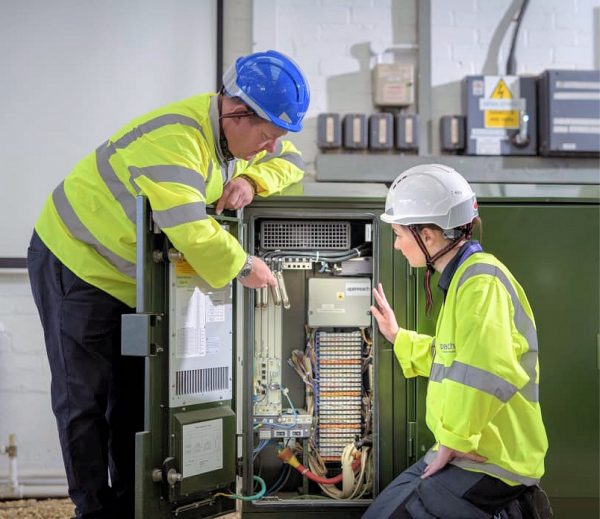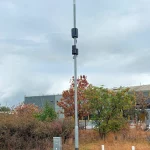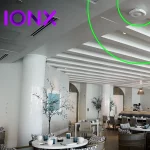Openreach Stops Selling Traditional Copper Phone in Mildenhall

Openreach (BT) has today taken the next step towards upgrading from analogue to digital services via the issuing of a “stop sell” notification in the trial area of Mildenhall (Suffolk), which means that new customers will now only be able to take all-IP (digital / VoIP) based phone and broadband services (no more analogue phones etc.).
Unlike the existing trial in Salisbury, which is focused on the separate but still broadly related exchange based upgrade process for Fibre-to-the-Premises (FTTP) broadband technology, the Mildenhall trial is more focused on the move from analogue telephony to digital (Internet Protocol) based voice services (both on copper and fibre lines).
The Mildenhall exchange was first chosen in 2019 (here) because it’s considered to be highly representative of a typical UK exchange area in terms of geography, the range of providers (ISPs etc.) offering Openreach services and its mix of businesses and consumers.
Advertisement
As per the original plan, Openreach has now (effective from 4th May 2021) issued a “stop sell” notification on non-IP services for Mildenhall. For existing customers this won’t have an immediate impact, but any new, upgrading, regrading or switching customers will now find that they can no longer take traditional analogue copper phone line and broadband services (e.g. all new products become digital).
In practice, you’ll still be able to order things like ADSL (SOTAP), FTTC (SoGEA) and G.fast (SoGfast) based broadband products just like you can today, which all still use copper lines, as well full fibre FTTP, but now if you want to attach a phone service to these then it’ll be a digital-only (all-IP) connection that goes over broadband (e.g. plugging an analogue or DECT phone handset into a router instead of your wall socket). Come December 2025 this will be the norm for everybody.
James Lilley, Openreach’s Director of Managed Migrations, said:
“This is an important early step in upgrading the UK to ‘Voice over IP’ technology and the withdrawal of products and services that run over the traditional telephone network – which is due to close in 2025. We’re working closely with service providers to make sure any changes happen as smoothly as possible.
We also have extensive learning from our recent work in Salisbury, which became the first city in the UK to rely solely on digital services.”
The trial is all about helping ISPs to adapt with new products or services, as well as helping homes and businesses to adapt when services that rely upon the older analogue network (e.g. lifts and certain alarm systems) stop working due to a lack of compatibility (this change is steadily becoming the norm across the world, not only in the UK). The wider industry is slowly adapting, but some people may need to upgrade their kit.
One other challenge here could come from landline-only customers (those without a broadband service), which may now face a weaker choice of providers because many ISPs have not yet replaced their phone-only packages with an all-IP based digital alternative. Some people may also need to buy a battery backup (powerbank) system for their router, otherwise they may lose both phone and broadband during a power cut (older analogue handsets could still be directly self-powered via Openreach’s copper lines).
Advertisement
Otherwise, Openreach has setup a webpage with further details for people in Mildenhall. We should add that the local “stop sell” notification is only the first phase of this process, with the next phase being the withdrawal of older services by December 2022.
Mark is a professional technology writer, IT consultant and computer engineer from Dorset (England), he also founded ISPreview in 1999 and enjoys analysing the latest telecoms and broadband developments. Find me on X (Twitter), Mastodon, Facebook, BlueSky, Threads.net and Linkedin.
« Study Finds Security Flaws in Routers Bundled by Big UK ISPs






















































Seems like a tall order to have everyone switched over to VoIP by end of 2025. We shall see.
We had bt digital installed in feb; bt switched off 3 weeks later and 4 phone numbers later have switched back to copper line. I hope the trial is more successful.
not really. For customers who don’t have the latest and greatest router from their ISP, they’ll be sent one. For those who do, the migration can happen in the background. If they actually use the phone service then they plug their existing phone into the router (or switch to integrated DECT) and carry on. BT, Sky and Virgin all have VoIP built into their latest routers.
It isn’t like FTTP where there’s an initial lump of effort required to install in every home, though it will play a part in getting people off the PSTN, since it is likely that anyone moving to FTTP will also mean VoIP
I would be interested to know what equipment (if any) BT will supply to enable you to use a fiber line as a telephone only option.
BT provide the Smart Hub 2 with standard UK corded phone socket. The Hub includes a DECT base for use with Essential and Advanced BT Dect handsets.
Sky provide Sky Hub with standard UK corded phone socket.
Mine was taped over hadn’t looked too hard, tried my old DECT phones and as you said they work.
I will disconnect the BT supplied ones and use the Panasonic’s instead.
Many 4G routers also have the phone socket functionality as well.
I’d expect they’ll send you a hub and maybe a phone just like now. They won’t be spending masses of R&D effort on an ever dwindling number of customers.
Openreach already offers ultra low speed products for ISPs who aren’t intending to offer much of an internet service.
Safer to provide your own equipment and have some independence. I use a Panasonic DECT VoIP basestation/handsets with Sipgate, it means I can change my ISP at any time without worrying about the phone. It also means I have all my credentials for the VoIP service and so can plug in the DECT phone into any network and have my landline with me wherever I go if required, or set up it up on the mobile phone. These are all benefits of VoIP, but you lose those benefits with the likes of BT and a HomeHub as you are tied to a single BT phone socket still. So all the negatives of VoIP without any benefits.
think that’s missing the point a little Phil. Aside from the probable demographic (people who want phone-only probably aren’t technical enough to be setting up their own kit), that would likely cost more than an ISP supplied solution + third party VoIP, and be harder to troubleshoot with multiple parties involved.
the ISP supplied solutions are landlines that happen to use VoIP and must follow the same regulations – they can’t claim that 999 may not work etc. They also receive priority on the network.
Phil
This is what I had hoped to do but when I got the FTTP installed I was moving from Plusnet and could not ensure I could keep my number if I did not transfer everything at the same time. Still I got a reasonable deal so when the contract ends I will reassess what I can do, as BT’s international charges are extortionate, 95p a minute to Australia plus connection charge, I only want to make a few calls each year.
I’m not saying it’s as cheap as VoIP, but BT do have addons that make it a lot cheaper. You certainly don’t have to pay 95p/min while retaining BT’s digital voice if you don’t want to.
VoIP calls could be easily hacked or scammed calls
Via what mechanism? You must know, if you are claiming it’s easy.
If VoIP credentials are gained then the number could be used from other locations without the customers knowledge but it would take some effort so its more likely to by someone simply being given access the router admin or in any communication to the customer regarding their phone setup.
BT and Sky have taken the approach that the credentials are hidden and remotely controlled. This provides for more security for their customers, allows them to manage quality/functionality and ensure fixed location for emergency calls.
If you use a third party VoIP provider then the user must ensure a fixed location is provided if you they intending to depend on it.
Various approaches exist between these two approaches. What we need is clear detail from each ISP offering voice as to their VoIP approach.
The credentials never leave the router and using the VoIP service means connecting to servers only reachable from the ISP’s own network.
No reason for them to be insecure at all. No more concerns than standard landlines.
People way smarter than your or I have worked on this. It’s fine.
@CarlT. Yes I agree for all the major ISPs offering integrated voice offerings and the recognised UK VoIP providers there is not much to worry about. All will gain in call encryption, quality and hopefully cost.
However with the transfer of millions of PSTN lines, for those wish to retain them, need to understand that not all VoIP services (or end to end interconnectivity) are the same and if they are given login credentials for an ATA or other then they keep them safe.
VoIP is used extensively by businesses, do you really think they would expose themselves to being hacked if it were “so easy”?
At least VoIP can be encrypted in transit, whereas landline calls can easily be tapped…
And yet openreach are still insisting certain currently-unconnected properties must place a phone only order before considering fibre availability, despite being in FTTP areas… Makes no sense for them to insist on copper-first in some areas while removing it in others.
I’m not sure why you think that but I’d love to know more – as that doesn’t sound correct at all. We provision lines all the time for FTTP where there is no copper option at all and you couldn’t place an order for it even if you wanted to.
Wish it’d stop selling “traditional copper to the home FTTC” too.
It already has.
In particular is has stopped in Salisbury and it has announced a further 296 exchanges where you will not longer be able to get FTTC if fibre is available, with copper stop sell dates of 29/06/21, 05/10/21, 25/01/22 and 29/04/22 depending on exchange.
This is a slightly different topic to the article though. The exchanges I mention are losing copper through fibre provision. The article is about losing analogue voice through VOIP provision, with the VOIP being provided over copper, using ADSL or VDSL, or over fibre.
The key point in all of this is that BT Openreach are running three separate but interrelated programmes:
– Replace the PSTN with VOIP.
– Replace Copper with fibre.
– Closing over 80% of their exchanges.
The first two are enablers for the third.
All that will mean if people who want a line have to pay for fttp on demand because there’s zero change of by paying to install fibre to everybody’s house
No.
I challenge you to find someone in Salisbury who is being forced to pay for FTTPod. I doubt you can even buy FTTPod in the Salisbury exchange area as there won’t be anywhere not covered by straight FTTP.
As I stated before, there are three separate programmes.
1. Replace the PSTN by VOIP, expected to be complete by 2025.
2. Replace copper by fibre, there is no end date for this. No-one will have to pay for FTTPod, in the mean time ADSL, VDSL and G.fast will be available (naked, without the corresponding analogue phone line). It will probably be sometime in the 2040s by the time the job is complete across the country but urban areas are likely to be complete by 2030, probably a lot earlier.
3. Close 4000+ telephone exchanges. This is driven by cost reduction but a lot of it is dependant on the removal of copper. The lease costs (BT does not own them) on those exchanges are likely to rise significantly in the 2030s, particularly in urban areas, so there is an incentive to push forward with fibre.
It is a creeping unannounced thing: some ISP are not selling FTTC where FTTP is available anyway.
Why would they: FTTP is more reliable and has pretty much guaranteed throughput.
FTTP is so much less hassle for everyone: it just works.
Now FTTP take up rates are high, and rising, it is validating BT’s investments and their stock price is rising: what is not to like?
So long as the uplift is spent on more FTTP, I for one, will be happy to see it.
AFACS, although the voice traffic will go over IP, the connection will still be to the telco’s phone system, rather than a “traditional” VOIP connection going via the public internet.
There has been a lot of discussion on this topic on VM’s help forum.
that’s more specific to the way VM (and any cable company) can do it, in their case they can keep the VoIP on its own network independent of any internet traffic
I believe BT, Sky and co have send the VoIP over the “internet connection” but it never actually leaves their network, and appropriate QoS is used to ensure it always gets through.